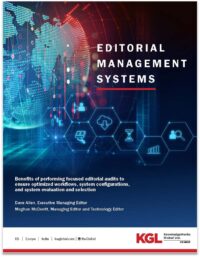In the fast-moving world of scholarly publishing, staying competitive isn’t just about the quality of your content—it’s also about the quality of your systems. For peer-reviewed journals, an effective Editorial Management System (EMS) is essential for upholding ethical standards, driving operational efficiency, and creating a smooth experience for authors, reviewers, and editors alike.
Yet, as our new whitepaper highlights, many journals continue to rely on outdated or underutilized EMS platforms. The result? Bottlenecks, inefficiencies, and missed opportunities for strategic growth.
Why Now Is the Time for an EMS Audit
KGL’s latest report, “Editorial Management Systems,” makes a timely and persuasive case for conducting regular EMS audits. Publishing technology doesn’t stand still—and neither should your workflows.
Journals often adopt an EMS and then stick with it for years without reassessing its capabilities. Meanwhile, user needs change, new features are introduced, and best practices evolve. What worked five years ago may now be limiting your team’s efficiency. A focused audit can help identify pain points, uncover unused features, and determine whether your current system is still fit for purpose.
Technology Has Changed—Have You?
From fax machines to AI-powered platforms, the EMS landscape has undergone dramatic change. Modern systems now do far more than manage submissions—they offer collaborative peer review, automated reviewer suggestions, integrity checks, and intelligent metadata tagging to reduce author workload.
Our report traces this evolution and reinforces one key insight: technology should support people, not the other way around. EMS platforms should empower editorial teams to do their best work, not hold them back.
“An EMS should be leveraged to support the people—editorial staff, authors, reviewers, editors—not just manage the process,” the authors state.
Preparing for What’s Next
The next generation of EMS tools will bring even greater capabilities—collaborative review environments, AI-driven reviewer matching, real-time editorial feedback, and deeper integration with research integrity tools.
But before journals can benefit from these innovations, they need a clear understanding of their current workflows, system limitations, and future needs. That’s where an EMS audit becomes more than just a tune-up—it becomes a strategic investment in the future of your publication.
Are You Getting the Most Out of Your EMS?
If your EMS hasn’t been reviewed in the last few years, it may be costing you more than you realize. A smart audit can improve efficiency, uncover cost savings, and enhance the experience for everyone involved in the peer review process.
Download the whitepaper to:
-
Discover how technology can better support your editorial office.
-
Learn what to consider in an EMS audit or system migration.
-
Read real-world case studies that reveal measurable improvements.

KnowledgeWorks Global Ltd. (KGL) is the industry leader in editorial, production, online hosting, and transformative services for every stage of the content lifecycle. We are your source for research integrity checks, peer review services, market analysis, intelligent automation, digital delivery, and more. Email us at info@kwglobal.com.





